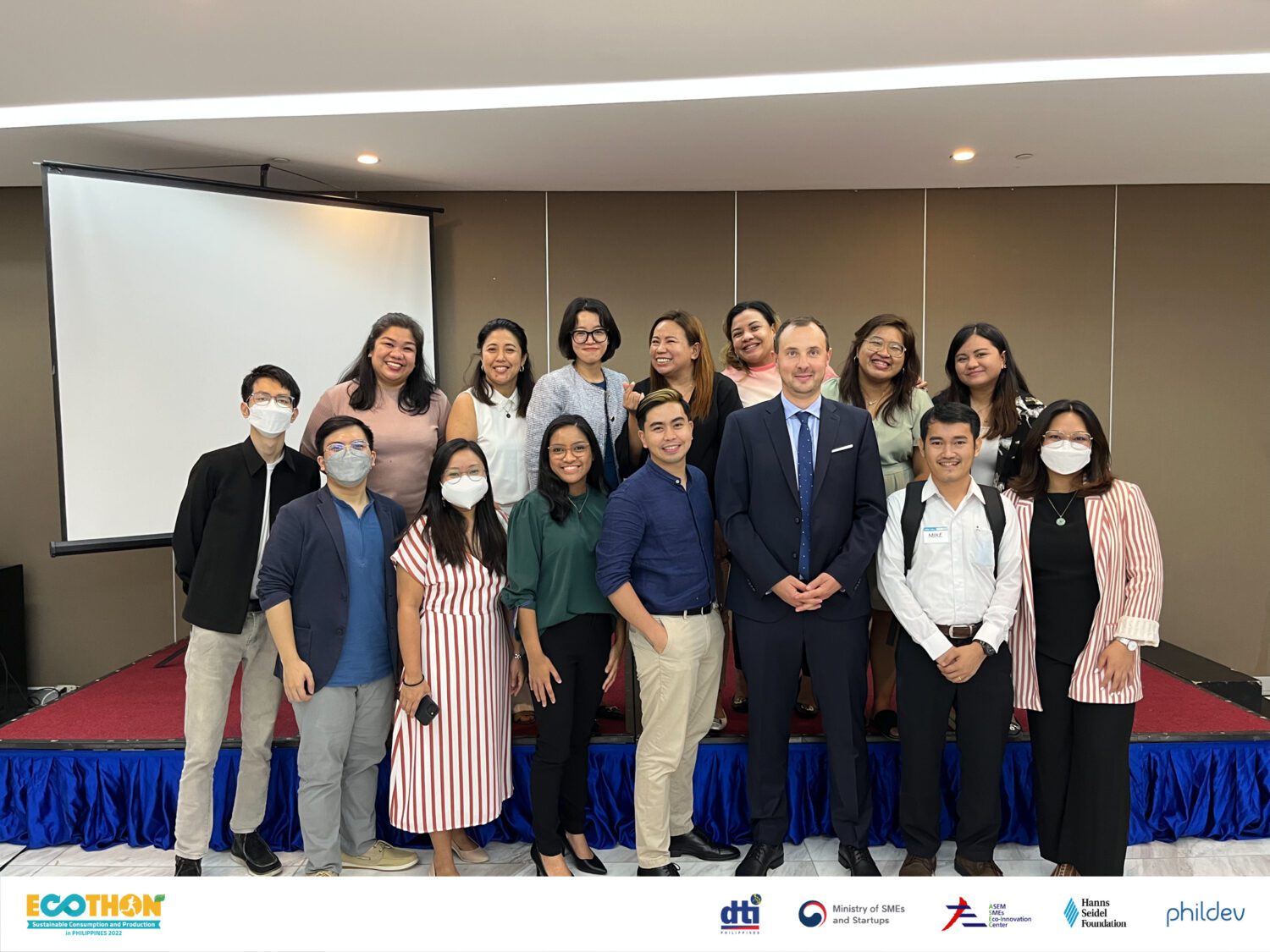MANILA, Philippines – Three eco-innovations were awarded a KRW 3 million grant to advance sustainable consumption and production at the Ecothon Philippines 2022 Demo Day held on 12 August at the Golden Phoenix Hotel in Pasay, Metro Manila.
Now on its second run in the Philippines, Ecothon once again sought for the most innovative solutions in the country that will further the United Nations Sustainable Development Goal 12: Sustainable Consumption and Production. The business competition is an ASEAN-wide initiative co-implemented by the Department of Trade and Industry (DTI), the Ministry for SMEs and Startups of the Republic of Korea (MSS), the ASEM SMEs Eco-Innovation Center (ASEIC), Hanns Seidel Foundation, and PhilDev Foundation.
Out of 74 applications, 10 finalists competed in the 3-day hybrid hackathon where they each received support from mentors and local coaches to refine their innovations and business models. The first two days of the competition were conducted virtually, while the demo day was conducted in Manila. Representatives from the top 10 teams flew in to pitch live to investors and government officials.
“Today’s demo day not only offers a great opportunity for our local startups to highlight their skills and talents as builders of a green economy, but it also demonstrates a strong commitment from the public and private sectors to promote and enable an innovative and sustainable business model development that minimizes negative environmental impact,” Dr. Rafaelita Aldaba, DTI Undersecretary for Competitiveness and Innovation Group, highlighted.
Dr. Francisco Sandejas, Chairman of PhilDev Foundation, furthered that the role of entrepreneurs has changed through the years, “There is a challenge to gain better understanding on the environmental and social impacts of our products and services; to create innovations that will allow our customers to reduce their own impacts and improve their overall well-being.”
Ecothon’s winning eco-innovations explored areas focusing on waste reduction and management. Salin PH, a social enterprise on a mission to reduce single-use plastic dependency and consumption, emerged as the hackathon champion, awarding them a KRW 1.5 million grant. Their innovation called Salin Swap offers consumers their go-to brands in reusable containers, making sustainable living possible at consumer level.
Winning second place is TENSIL Abaca Fiber Tiles, a startup aiming to revolutionize the housing industry by offering sustainable construction materials. Their product is an abaca fiber tile made from fiber wastes that allows their clients to build structures at low cost and with minimal environmental impact. Alongside this, producing the tiles increases the income of abaca farmers in their partner community in Catanduanes. TENSIL received a KRW 1 million grant from the competition. They will use the grant to conduct further research on their prototype.
The third placer of the hackathon uses the natural technology of black soldier flies (Hermetia illucens). BSF ECOways Small Solution is a Pangasinan-based startup breeding black soldier flies to aid livestock raisers and local feed manufacturers in producing cheaper but quality animal protein source. BSF received a KRW 500,000 grant for their innovation. Michael Siegner, Country Representative of Hanns Seidel Foundation Vietnam, concluded the demo day highlighting the need for sustainability champions across the region. He then furthered the need “to combine profit and sustainability, not price one over the other,” in doing
business.
“I think it has always been about that combination that we can be successful in building back better and greener,” Siegner shared.
Aside from receiving grants, the winners will have the opportunity to represent the Philippines and participate in global startup events and local acceleration programs with support from ASEIC. To learn more about Ecothon and the winning startups in the Philippines, visit www.ecothon.net.
